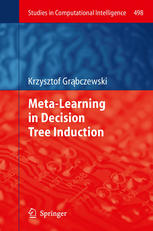

Most ebook files are in PDF format, so you can easily read them using various software such as Foxit Reader or directly on the Google Chrome browser.
Some ebook files are released by publishers in other formats such as .awz, .mobi, .epub, .fb2, etc. You may need to install specific software to read these formats on mobile/PC, such as Calibre.
Please read the tutorial at this link: https://ebookbell.com/faq
We offer FREE conversion to the popular formats you request; however, this may take some time. Therefore, right after payment, please email us, and we will try to provide the service as quickly as possible.
For some exceptional file formats or broken links (if any), please refrain from opening any disputes. Instead, email us first, and we will try to assist within a maximum of 6 hours.
EbookBell Team

0.0
0 reviewsThe book focuses on different variants of decision tree induction but also describes the meta-learning approach in general which is applicable to other types of machine learning algorithms. The book discusses different variants of decision tree induction and represents a useful source of information to readers wishing to review some of the techniques used in decision tree learning, as well as different ensemble methods that involve decision trees. It is shown that the knowledge of different components used within decision tree learning needs to be systematized to enable the system to generate and evaluate different variants of machine learning algorithms with the aim of identifying the top-most performers or potentially the best one. A unified view of decision tree learning enables to emulate different decision tree algorithms simply by setting certain parameters. As meta-learning requires running many different processes with the aim of obtaining performance results, a detailed description of the experimental methodology and evaluation framework is provided. Meta-learning is discussed in great detail in the second half of the book. The exposition starts by presenting a comprehensive review of many meta-learning approaches explored in the past described in literature, including for instance approaches that provide a ranking of algorithms. The approach described can be related to other work that exploits planning whose aim is to construct data mining workflows. The book stimulates interchange of ideas between different, albeit related, approaches.